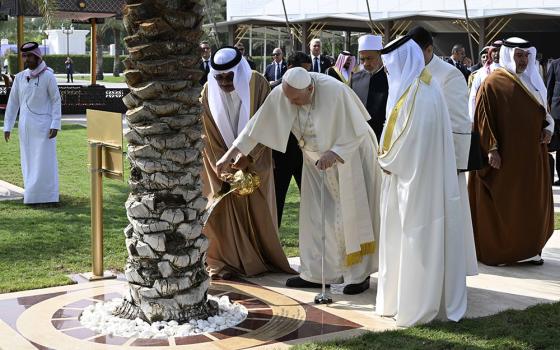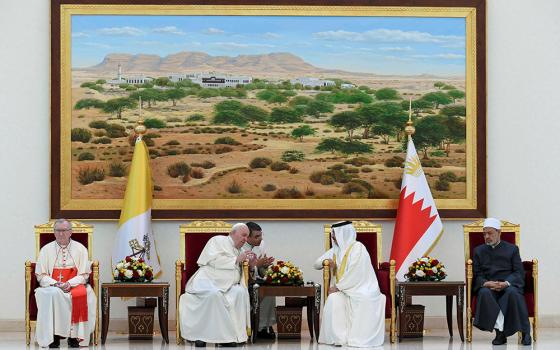Pope Francis receives the offertory gifts during Mass Nov. 5 in Bahrain National Stadium in Awali. (CNS/Vatican Media)
Pope Francis on Nov. 5 celebrated a Mass for over 30,000 faithful from across the Arabian Peninsula, telling the region's minority Catholic population that working toward peace must always be the aim of the Christian life.
"There will be cases of friction, moments of tension, conflicts and opposing viewpoints, but those who follow the Prince of Peace must always strive for peace," said the pope. "Even when evil is done to us," he said, Catholics must persevere in "breaking the spiral of vengeance, disarming violence [and] demilitarizing the heart."
During his homily, the pope insisted that peace was not a lofty ideal, but something first put into practice through "concrete situations" each day, through family life, in workplaces and among neighbors.
Francis' Nov. 5 Mass at Bahrain's National Stadium marked only the second time a pope has celebrated Mass on the Arabian Peninsula. In 2019, he became the first pope to ever do so during his visit to the United Arab Emirates.
Of the 1.8 million residents of the Persian Gulf kingdom, only about 80,000 are Catholics, the overwhelming majority of whom are migrant workers from Sri Lanka, India, the Philippines and other surrounding Middle East countries.
Pope Francis arrives to celebrate Mass at Bahrain National Stadium in Awali, Bahrain, Nov. 5. At far right is Bishop Paul Hinder, administrator of the Apostolic Vicariate of Northern Arabia. (CNS photo/Reuters/Hamad I Mohammed)
The pope acknowledged this reality, saying that Christians — especially those who live in faraway places, whose neighbors may also come from different cultures or countries — must lead by example in their witness of welcoming and peacemaking.
"This very land is a living image of coexistence in diversity, and indeed an image of our world, increasingly marked by the constant migration of peoples and by a pluralism of ideas, customs and traditions," said Francis.
Christ, said the pope, suffers "when he sees in our own day and in many parts of the world, ways of exercising power that feed on oppression and violence, seeking to expand their own space by restricting that of others, imposing their own domination and restricting basic freedoms, and in this way oppressing the weak."
He called on Catholics to be countercultural, modeling their lives on Christ's unconditional love for all people.
"Not only when things are going well and we feel like loving, but always," said Francis. "Not only towards our friends and neighbors, but towards everyone, including our enemies."
"Happiness in life," he said, "comes through the Beatitudes and consists in our becoming peacemakers."
Advertisement
While the primary purpose of Francis' visit to the country was to participate in a major summit of interreligious leaders, the small, but dynamic Catholic community was also eager to welcome the pope to the region.
Anthony and Maria George-Vincent, a married couple from India who have lived in Bahrain for over 30 years and serve as Catholic catechists at their parish, said that welcoming "Father Francis" would be an occasion to show "we are all brothers and sisters here."
"We hope it will be an eye-opener for other countries," Anthony George-Vincent, 67, told NCR ahead of the Mass.
Amor Pimentel, who moved from the Philippines to Saudi Arabia 29 years ago, said he made the one-hour drive across the King Fahd Causeway, which connects Saudi Arabia to Bahrain, joined by 10 other Catholics.
He said they were eager to have the chance to participate in a public Mass, something they are unable to do in Saudi Arabia. "This is very sacred for us," he said.
And 74-year-old Frenchman Jean Dtinguy, who has lived in Bahrain for 45 years working in finance, told NCR that the country is a "melting pot" for both cultures and religions.
While Francis, during his second day in the country Nov. 5, said it is important to avoid syncretism, he said that part of the reason for his visit was to promote peace, both through Muslim-Catholic dialogue, but also among other Christian traditions.
The evening before the papal Mass, on Nov. 5, Francis presided over a joint prayer service at the Cathedral of Our Lady of Arabia, the largest Catholic Cathedral in the Middle East. He was joined by Ecumenical Patriarch Bartholomew of Constantinople and other Eastern Orthodox and Anglican religious leaders.
The "badge" of Christians, said the pope, is to "love everyone."
"We cannot truly witness to the God of love," he told the ecumenical leaders, "unless we are united among ourselves in accordance with his will, and we cannot be united by remaining apart, without openness to witness, without expanding the boundaries of our interests and of our communities in the name of the Spirit who embraces every language and reaches out to everyone."
During his final evening in the country, on Nov. 5, Francis met with several hundred Bahraini young people at the Sacred Heart School in the heart of the country's capital city of Manama, where he continued his theme of the need for friendship and the need for diverse cultures to live alongside one another peacefully.
"To you, young people, who are more straightforward and more capable of making contacts and building friendships, overcoming prejudices and ideological barriers, I would like to say this: continue to sow the seeds of fraternity, and you will be builders of the future, because only in fraternity will our world have a future," the pope said.
"Jesus tells us never to separate the love of God from love of neighbor, and to become neighbors to everyone. Everyone, not just the people we like," he added. "To live as brothers and sisters is the universal vocation entrusted to every creature."
On the morning of Nov. 6, Francis will preside over a prayer service for the region's bishops, priests and religious women and men before returning to Rome in the evening.
Editor's Note: This story has been updated to add comments Pope Francis made to Bahraini young people on Nov. 5.






